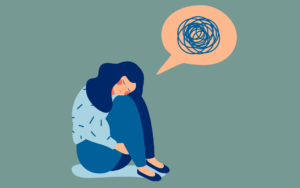Living with a mental health condition can be incredibly difficult, especially when it’s something like OCD or anxiety. These conditions can make everyday life a challenge, but help is available. One of the best ways to manage OCD and anxiety is through therapy. But the question remains – where do you find a reliable, effective therapy for these conditions? This blog post will discuss all of your options for finding therapy for OCD and anxiety near you. From online counseling to in-person sessions and more, we’ll cover everything you need to know about seeking mental health treatment in your area.
Contents
OCD And Anxiety

There are a lot of people who suffer from OCD and anxiety. It can be tough to deal with these disorders, but there is help available. If you or someone you know suffers from OCD or anxiety, some therapists can help.
OCD, or Obsessive Compulsive Disorder, is characterized by repetitive thoughts and behaviors. People with OCD often have obsessive thoughts about things like germs or dirt. They may also wash their hands frequently or avoid touching things that they think are dirty. These behaviors can interfere with daily life and make it difficult for people to function normally.
Anxiety disorders are characterized by feelings of fear, worry, and nervousness. People with anxiety disorders may have trouble sleeping, sweating, or shaking. They may also avoid certain places or activities because they are afraid of having panic attacks. Like OCD, anxiety disorders can be debilitating and make it hard for people to live normal lives.
If you or someone you know suffers from OCD or anxiety, there is help available. Therapists who specialize in treating these disorders can provide support and guidance. They can help people learn how to cope with their symptoms and manage their disorders. If you think you might benefit from therapy, please reach out for help.
Therapy For OCD And Anxiety Near Me
If you’re looking for therapy for OCD and anxiety near you, there are a few things to keep in mind.
Some of the types of therapy for OCD and anxiety include :
Cognitive Behavioral Therapy
One of the most popular types of therapy for OCD and anxiety is cognitive behavioral therapy (CBT). This type of therapy focuses on changing negative thought patterns and behaviors that can lead to anxiety and obsessive-compulsive behavior. CBT teaches people how to recognize their thoughts, challenge them, and replace them with more positive ones.
Exposure Therapy
Exposure therapy is another type of therapy used for individuals with OCD or anxiety. During exposure therapy, a person is exposed to the object or situation they are afraid of to reduce their fear or anxiety around it. With the help of a therapist, the person gradually learns how to cope with their fear in a safe environment.
Dialectical Behavior Therapy
Dialectical behavior therapy (DBT) is a type of cognitive-behavioral therapy that focuses on learning new skills to cope with difficult situations. People who suffer from OCD and anxiety often struggle with regulating their emotions. DBT helps people learn healthy ways of managing stress and intense emotions to better cope with their fears and anxieties.
Other Therapies
In addition to these forms of treatment, there are also other therapies available for those struggling with OCD or anxiety. These include supportive counseling, relaxation techniques, and mindfulness. These therapies can help people gain a better understanding of their condition and learn how to manage it on their own.
Finding Therapy For OCD And Anxiety

If you are looking for therapy for OCD and anxiety near me, there are a few things that you can do to find the help that you need. The first step is to contact your insurance company and ask them for a list of mental health providers in your area. Once you have this list, you can start to narrow down your options by looking at each provider’s website and reading reviews from past patients.
Another great way to find a therapist near you is to ask friends or family members if they have any recommendations. If you know someone who has been through therapy before, they may be able to point you in the right direction. Finally, don’t hesitate to reach out to your local mental health association or community center for more ideas.
Once you have compiled a list of potential therapists, it’s important to take some time to research each one. Make sure to read their bios carefully and look for any red flags that could indicate they aren’t a good fit for you. For example, if a therapist only seems to treat patients with severe OCD, they may not be the best choice for someone with milder symptoms.
It’s also important to consider whether or not a therapist uses evidence-based treatments for OCD and anxiety. These treatments have been proven to be effective in numerous studies and are more likely to lead to positive outcomes than therapies that haven’t been as well researched.
Benefits of Therapy
When it comes to mental health, there is no one-size-fits-all approach. What works for one person may not work for another. That’s why it’s important to find a therapist specializing in treating OCD and anxiety disorders.
There are many benefits of therapy for OCD and anxiety disorders. Therapists can help you understand your disorder and develop coping mechanisms to deal with your symptoms. They can also provide support and guidance as you work towards recovery.
If you suffer from OCD or anxiety, finding a therapist specializing in these disorders can be incredibly beneficial. If you’re not sure where to start, ask your doctor for a referral or search online for therapists in your area.
Limitations of Therapy
There are a few limitations to therapy for OCD and anxiety near me. First, not all therapists are created equal. There are many great therapists out there, but there are also some that are not so great. It is important to do your research and find a therapist that you feel comfortable with and that you feel is knowledgeable about OCD and anxiety.
Second, therapy can be expensive. If you do not have insurance or if your insurance does not cover therapy, it can be very costly. However, there are many ways to get around this. Such as sliding scales or finding a therapist who offers pro-bono services.
Third, therapy takes time. It is important to be patient when starting therapy and to understand that it may take several sessions before you start seeing results. Be sure to communicate with your therapist about your goals for therapy and how often you would like to meet.
Fourth, some people may not respond well to therapy. This does not mean that the therapy is bad, but rather that the person may not be ready for change or they may not be a good fit for the therapist. If this happens, it is important to find a different therapist that you feel more comfortable with.
Lastly, remember that YOU are in control of your OCD and anxiety. No one else can fix it for you; only you have the power to make the changes necessary to improve your life. Therapy can help guide you on this journey, but ultimately it is up to you.
Conclusion
We hope this article has given you a better understanding of what OCD and anxiety are, the different types of therapy available to treat them, and where to find therapists in your local area. If you think that you may benefit from therapy for OCD or anxiety, don’t hesitate to reach out and contact a therapist near you. With the right support and treatment plan, it is possible to manage these conditions effectively and live a full life with fewer symptoms.
For more information and guidance, please contact OCDMantra. OCD is a mental health disorder with obsessions and compulsions. If you have any queries regarding OCD treatment, ERP therapy experienced therapists at OCDMantra can help: Book a trial OD therapy session.


